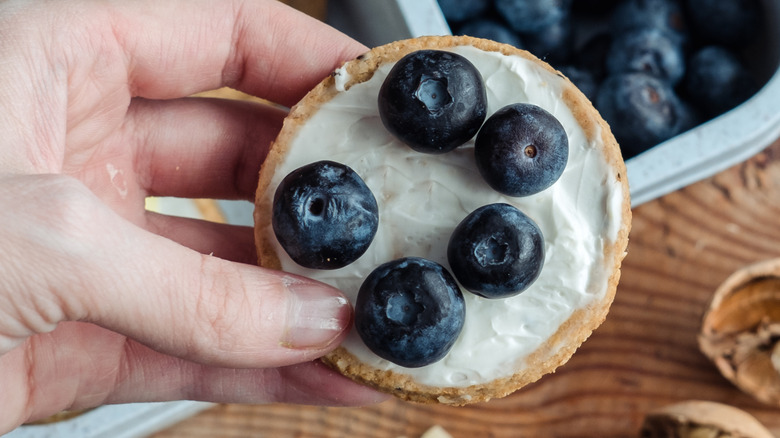
Miljko/Getty Images
A cup of berries can be a refreshing yet healthy dessert, especially topped with a little whipped cream. What’s a shortcake without summer strawberries? Berries also bring a touch of sweetness to your yogurt and oatmeal, kicking off your morning with a good dose of vitamin C. And let’s not forget that bit of tart they add to a post-workout smoothie.
But berries aren’t just pretty and tasty. Berries are rich in antioxidants that battle free radicals that can cause oxidative stress. These little nutritional powerhouses are also packed with fiber, which your body loves more than you might realize. Blueberries, for example, serve up nearly 4 grams of fiber per cup, offering a mix of both soluble and insoluble fiber. Soluble fiber mixes with water in your gut, slowing down digestion and helping to lower cholesterol levels. Insoluble fiber, on the other hand, stays intact as it moves through your digestive system, sweeping out waste and helping you stay regular. (By the way, here’s everything you need to know about fiber.)
Plant-based nutrients in blueberries lower cholesterol

Elvira Kashapova/Getty Images
While fiber helps sweep cholesterol out of your body, other nutrients in foods like blueberries may also play a role in keeping your cholesterol levels in check. The deep blue color of blueberries comes from anthocyanins, which are powerful antioxidants. A 2012 study in the European Journal of Nutrition looked at how these compounds might affect cholesterol. Researchers fed hamsters different amounts of blueberry anthocyanins and then measured their blood cholesterol and the amount of cholesterol they eliminated in their feces. After six weeks, the hamsters who received blueberry anthocyanins had lower blood cholesterol levels and excreted more cholesterol through their poop.
Blueberries may also offer broader benefits for your metabolic health. In a 2017 study in the Journal of Functional Foods, participants swapped 50 grams of carbohydrates in their daily diet for 50 grams of blueberries (about one-third of a cup) over 12 weeks. Another group followed a healthy diet but without the blueberries. The group eating blueberries saw significant drops in both total and LDL (“bad”) cholesterol compared to the control group. They also lost more weight and improved their insulin resistance, suggesting blueberries might support both heart health and blood sugar control.
Blueberries are good for your brain, gut, and exercise recovery

Inside Creative House/Shutterstock
You may want to add some blueberries to protect your brain as you age. According to a 2024 review in Frontiers in Nutrition, a serving of blueberries and two servings of strawberries every week can slow cognitive decline and improve your brain function. By improving blood flow to the brain, lowering inflammation, and reducing oxidative stress, eating blueberries every day may be key to a healthy brain.
Your gut microbiome also factors into your overall health, and blueberries may keep your digestive system in balance. The polyphenols in blueberries are broken down by your gut bacteria, and their byproducts may help reduce inflammation, strengthen the gut lining, and promote the growth of bacteria linked to better brain and heart health.
After a hard workout, try adding some blueberries to your post-workout protein shake. The antioxidants in blueberries reduce oxidative stress caused by high-intensity exercise. Blueberries also boost anti-inflammatory proteins and reduce harmful proteins to help you recover more quickly from your hard workouts. However, blueberries may not be as effective for people who don’t typically exercise.
Credit: healthdigest.com









